Impact of Employability Prospectus and Gender Gap in UK Businesses
VerifiedAdded on 2023/01/19
|8
|1988
|34
Report
AI Summary
This report delves into the complexities of graduate employability, exploring the challenges faced by fresh graduates in meeting employer expectations. It highlights the skills, such as communication, interpersonal abilities, and leadership, that employers seek, and the impact of the skills gap on performance. The report also examines the gender gap in the UK labour market, discussing its causes, including the underrepresentation of women in senior roles and their concentration in lower-paying sectors. It analyzes the effects of the gender pay gap on businesses, such as reduced innovation and increased employee turnover, while also emphasizing the importance of gender equity for a skilled workforce and economic balance. The report concludes by emphasizing the need for graduates to focus on skill development and for businesses to eliminate gender inequality to foster dynamic environments and achieve their objectives.
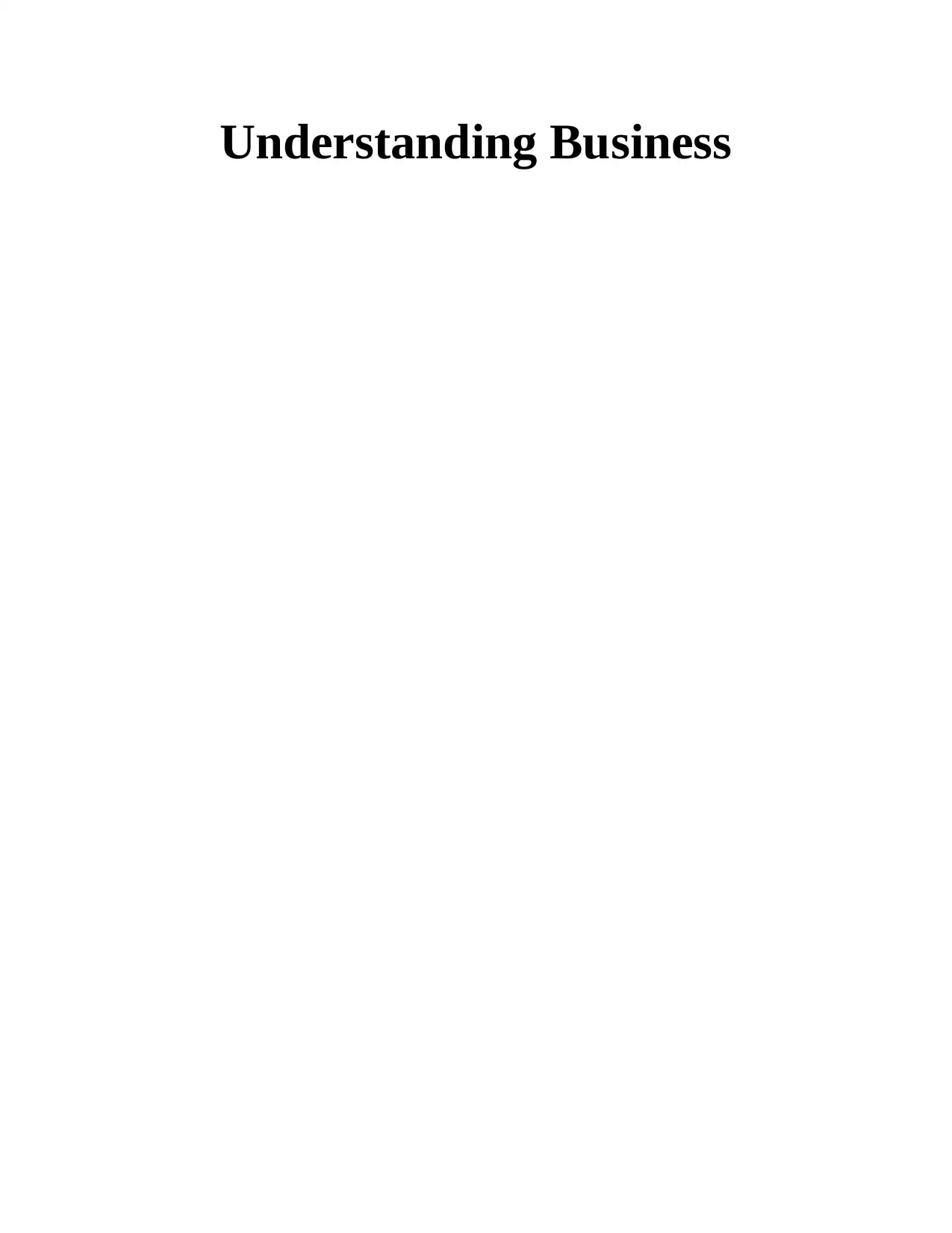
Understanding Business
Paraphrase This Document
Need a fresh take? Get an instant paraphrase of this document with our AI Paraphraser
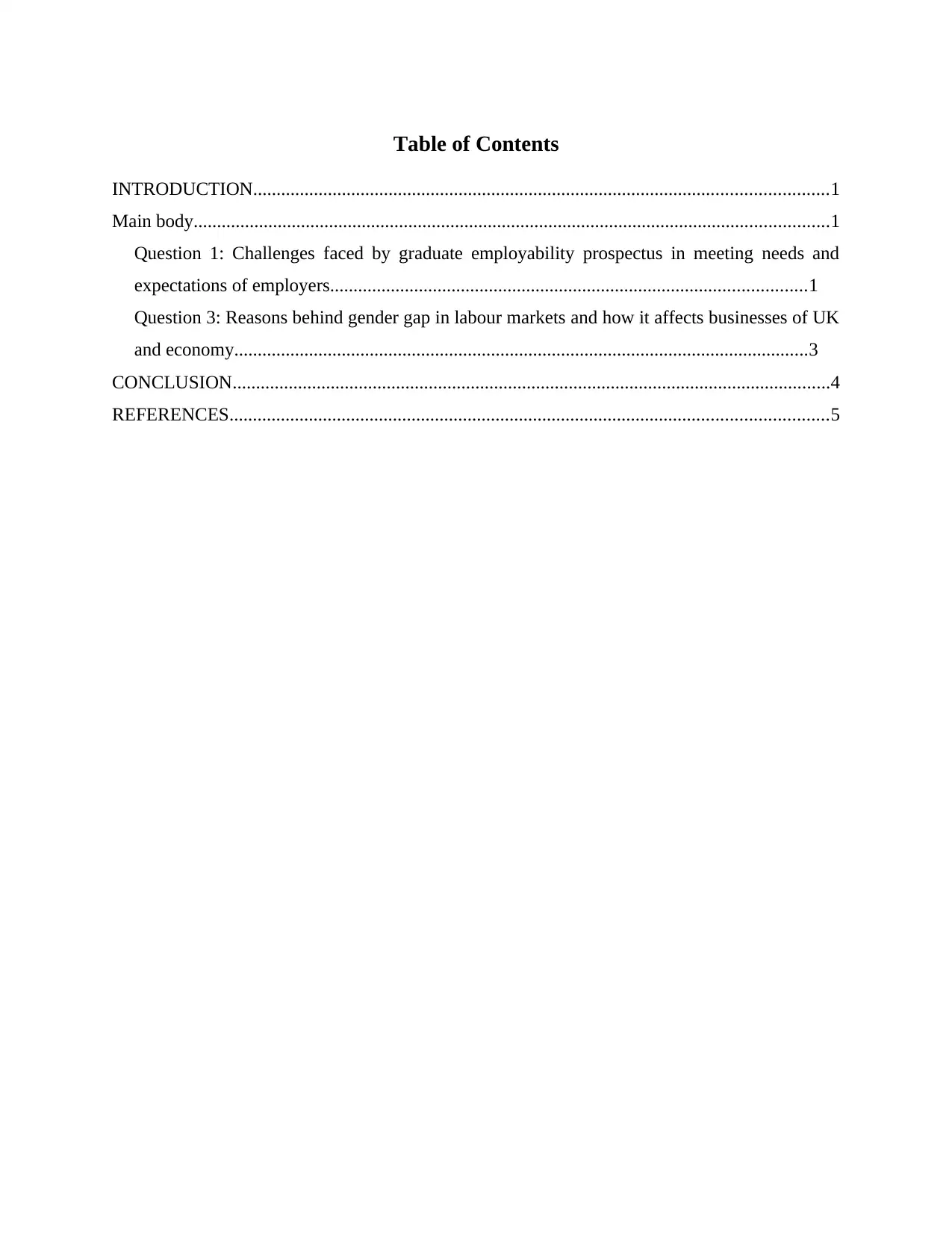
Table of Contents
INTRODUCTION...........................................................................................................................1
Main body........................................................................................................................................1
Question 1: Challenges faced by graduate employability prospectus in meeting needs and
expectations of employers......................................................................................................1
Question 3: Reasons behind gender gap in labour markets and how it affects businesses of UK
and economy...........................................................................................................................3
CONCLUSION................................................................................................................................4
REFERENCES................................................................................................................................5
INTRODUCTION...........................................................................................................................1
Main body........................................................................................................................................1
Question 1: Challenges faced by graduate employability prospectus in meeting needs and
expectations of employers......................................................................................................1
Question 3: Reasons behind gender gap in labour markets and how it affects businesses of UK
and economy...........................................................................................................................3
CONCLUSION................................................................................................................................4
REFERENCES................................................................................................................................5

⊘ This is a preview!⊘
Do you want full access?
Subscribe today to unlock all pages.

Trusted by 1+ million students worldwide
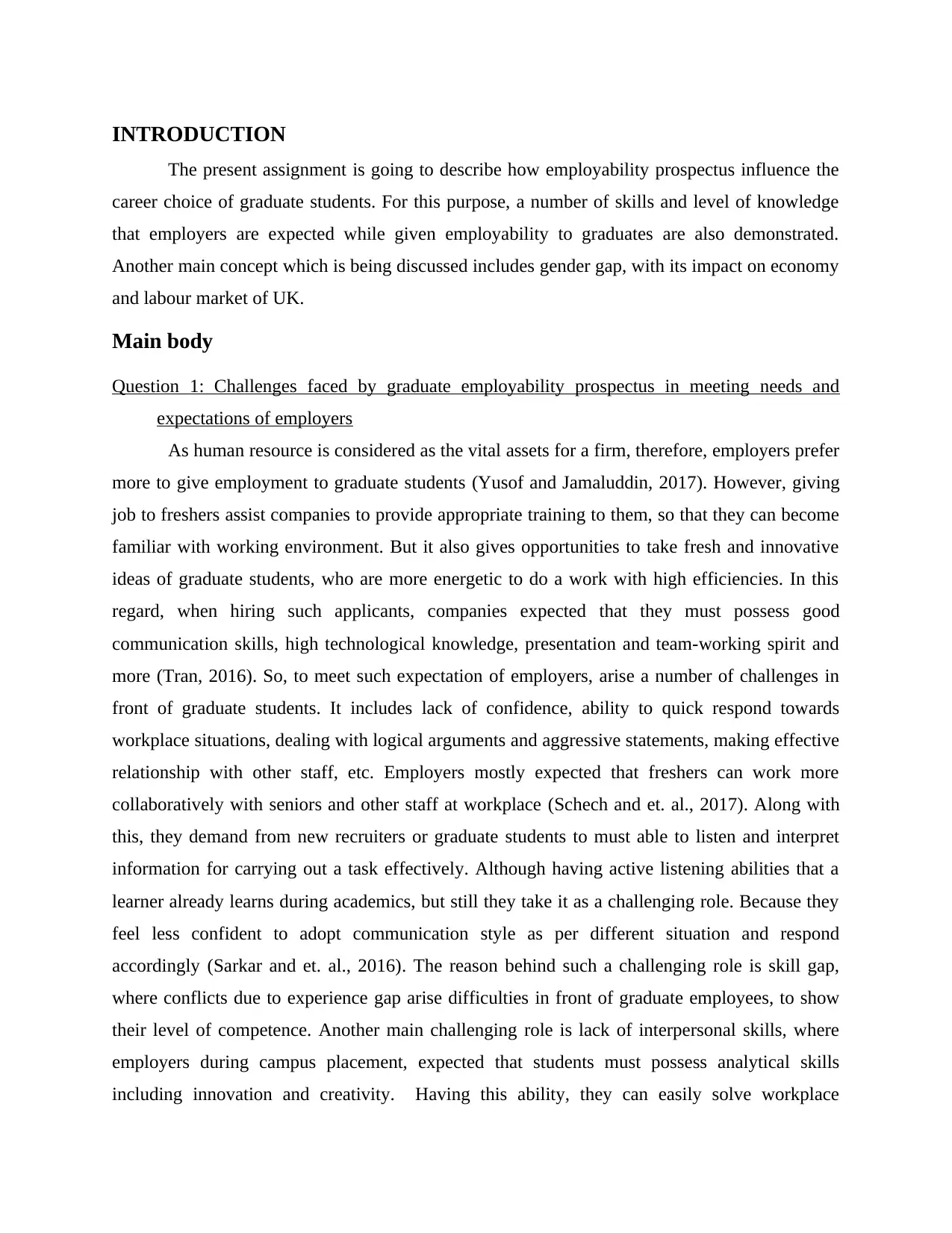
INTRODUCTION
The present assignment is going to describe how employability prospectus influence the
career choice of graduate students. For this purpose, a number of skills and level of knowledge
that employers are expected while given employability to graduates are also demonstrated.
Another main concept which is being discussed includes gender gap, with its impact on economy
and labour market of UK.
Main body
Question 1: Challenges faced by graduate employability prospectus in meeting needs and
expectations of employers
As human resource is considered as the vital assets for a firm, therefore, employers prefer
more to give employment to graduate students (Yusof and Jamaluddin, 2017). However, giving
job to freshers assist companies to provide appropriate training to them, so that they can become
familiar with working environment. But it also gives opportunities to take fresh and innovative
ideas of graduate students, who are more energetic to do a work with high efficiencies. In this
regard, when hiring such applicants, companies expected that they must possess good
communication skills, high technological knowledge, presentation and team-working spirit and
more (Tran, 2016). So, to meet such expectation of employers, arise a number of challenges in
front of graduate students. It includes lack of confidence, ability to quick respond towards
workplace situations, dealing with logical arguments and aggressive statements, making effective
relationship with other staff, etc. Employers mostly expected that freshers can work more
collaboratively with seniors and other staff at workplace (Schech and et. al., 2017). Along with
this, they demand from new recruiters or graduate students to must able to listen and interpret
information for carrying out a task effectively. Although having active listening abilities that a
learner already learns during academics, but still they take it as a challenging role. Because they
feel less confident to adopt communication style as per different situation and respond
accordingly (Sarkar and et. al., 2016). The reason behind such a challenging role is skill gap,
where conflicts due to experience gap arise difficulties in front of graduate employees, to show
their level of competence. Another main challenging role is lack of interpersonal skills, where
employers during campus placement, expected that students must possess analytical skills
including innovation and creativity. Having this ability, they can easily solve workplace
The present assignment is going to describe how employability prospectus influence the
career choice of graduate students. For this purpose, a number of skills and level of knowledge
that employers are expected while given employability to graduates are also demonstrated.
Another main concept which is being discussed includes gender gap, with its impact on economy
and labour market of UK.
Main body
Question 1: Challenges faced by graduate employability prospectus in meeting needs and
expectations of employers
As human resource is considered as the vital assets for a firm, therefore, employers prefer
more to give employment to graduate students (Yusof and Jamaluddin, 2017). However, giving
job to freshers assist companies to provide appropriate training to them, so that they can become
familiar with working environment. But it also gives opportunities to take fresh and innovative
ideas of graduate students, who are more energetic to do a work with high efficiencies. In this
regard, when hiring such applicants, companies expected that they must possess good
communication skills, high technological knowledge, presentation and team-working spirit and
more (Tran, 2016). So, to meet such expectation of employers, arise a number of challenges in
front of graduate students. It includes lack of confidence, ability to quick respond towards
workplace situations, dealing with logical arguments and aggressive statements, making effective
relationship with other staff, etc. Employers mostly expected that freshers can work more
collaboratively with seniors and other staff at workplace (Schech and et. al., 2017). Along with
this, they demand from new recruiters or graduate students to must able to listen and interpret
information for carrying out a task effectively. Although having active listening abilities that a
learner already learns during academics, but still they take it as a challenging role. Because they
feel less confident to adopt communication style as per different situation and respond
accordingly (Sarkar and et. al., 2016). The reason behind such a challenging role is skill gap,
where conflicts due to experience gap arise difficulties in front of graduate employees, to show
their level of competence. Another main challenging role is lack of interpersonal skills, where
employers during campus placement, expected that students must possess analytical skills
including innovation and creativity. Having this ability, they can easily solve workplace
Paraphrase This Document
Need a fresh take? Get an instant paraphrase of this document with our AI Paraphraser
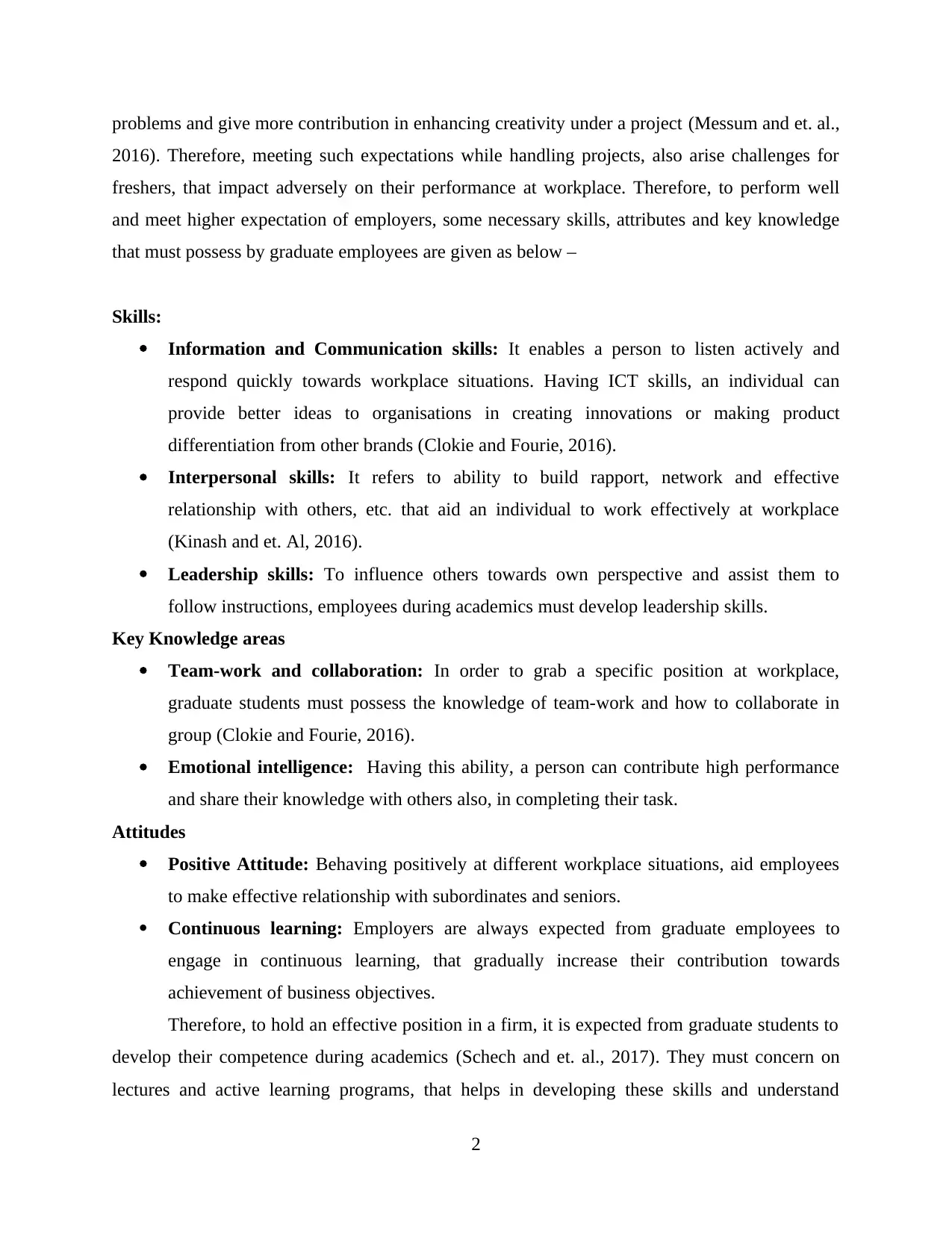
problems and give more contribution in enhancing creativity under a project (Messum and et. al.,
2016). Therefore, meeting such expectations while handling projects, also arise challenges for
freshers, that impact adversely on their performance at workplace. Therefore, to perform well
and meet higher expectation of employers, some necessary skills, attributes and key knowledge
that must possess by graduate employees are given as below –
Skills:
Information and Communication skills: It enables a person to listen actively and
respond quickly towards workplace situations. Having ICT skills, an individual can
provide better ideas to organisations in creating innovations or making product
differentiation from other brands (Clokie and Fourie, 2016).
Interpersonal skills: It refers to ability to build rapport, network and effective
relationship with others, etc. that aid an individual to work effectively at workplace
(Kinash and et. Al, 2016).
Leadership skills: To influence others towards own perspective and assist them to
follow instructions, employees during academics must develop leadership skills.
Key Knowledge areas
Team-work and collaboration: In order to grab a specific position at workplace,
graduate students must possess the knowledge of team-work and how to collaborate in
group (Clokie and Fourie, 2016).
Emotional intelligence: Having this ability, a person can contribute high performance
and share their knowledge with others also, in completing their task.
Attitudes
Positive Attitude: Behaving positively at different workplace situations, aid employees
to make effective relationship with subordinates and seniors.
Continuous learning: Employers are always expected from graduate employees to
engage in continuous learning, that gradually increase their contribution towards
achievement of business objectives.
Therefore, to hold an effective position in a firm, it is expected from graduate students to
develop their competence during academics (Schech and et. al., 2017). They must concern on
lectures and active learning programs, that helps in developing these skills and understand
2
2016). Therefore, meeting such expectations while handling projects, also arise challenges for
freshers, that impact adversely on their performance at workplace. Therefore, to perform well
and meet higher expectation of employers, some necessary skills, attributes and key knowledge
that must possess by graduate employees are given as below –
Skills:
Information and Communication skills: It enables a person to listen actively and
respond quickly towards workplace situations. Having ICT skills, an individual can
provide better ideas to organisations in creating innovations or making product
differentiation from other brands (Clokie and Fourie, 2016).
Interpersonal skills: It refers to ability to build rapport, network and effective
relationship with others, etc. that aid an individual to work effectively at workplace
(Kinash and et. Al, 2016).
Leadership skills: To influence others towards own perspective and assist them to
follow instructions, employees during academics must develop leadership skills.
Key Knowledge areas
Team-work and collaboration: In order to grab a specific position at workplace,
graduate students must possess the knowledge of team-work and how to collaborate in
group (Clokie and Fourie, 2016).
Emotional intelligence: Having this ability, a person can contribute high performance
and share their knowledge with others also, in completing their task.
Attitudes
Positive Attitude: Behaving positively at different workplace situations, aid employees
to make effective relationship with subordinates and seniors.
Continuous learning: Employers are always expected from graduate employees to
engage in continuous learning, that gradually increase their contribution towards
achievement of business objectives.
Therefore, to hold an effective position in a firm, it is expected from graduate students to
develop their competence during academics (Schech and et. al., 2017). They must concern on
lectures and active learning programs, that helps in developing these skills and understand
2
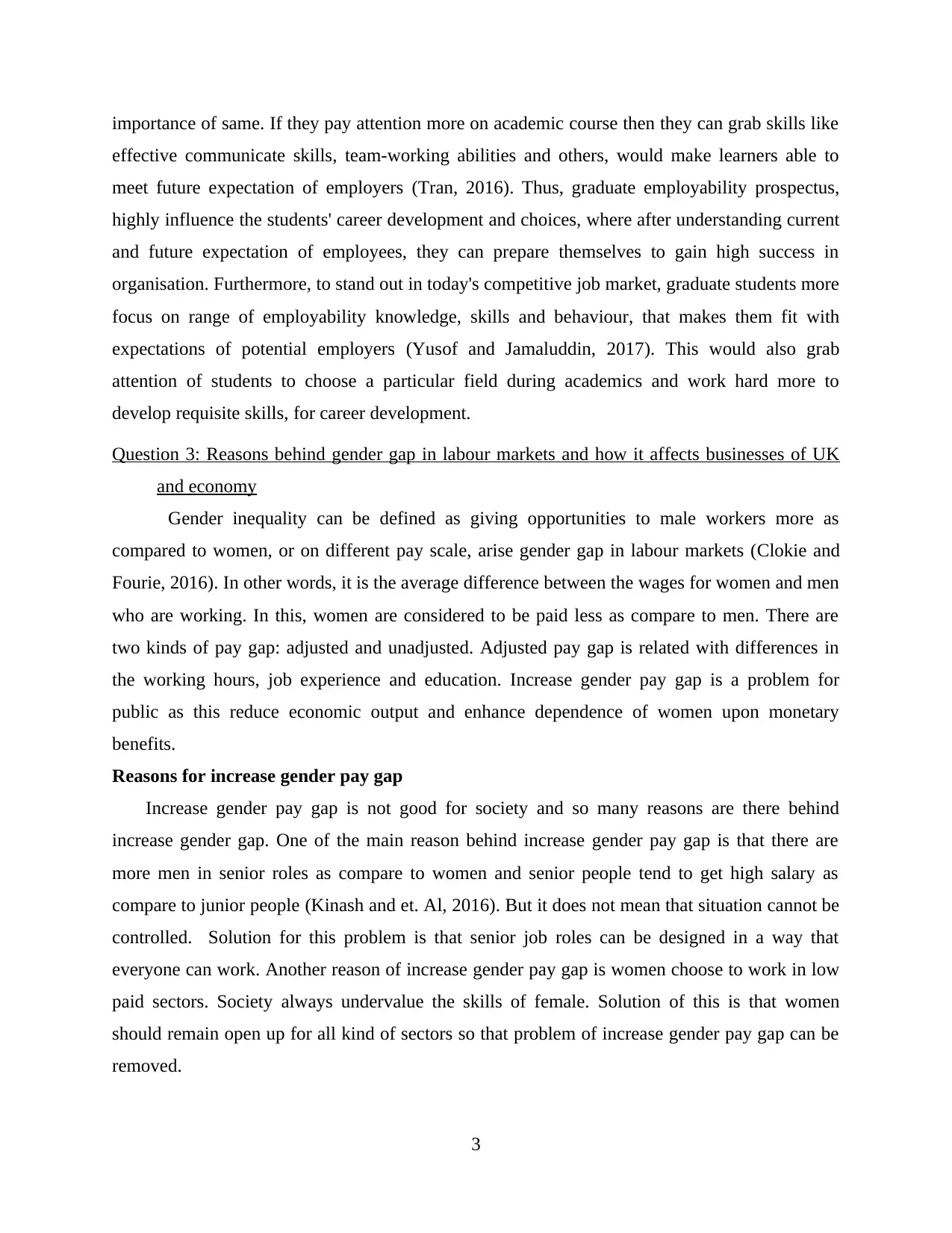
importance of same. If they pay attention more on academic course then they can grab skills like
effective communicate skills, team-working abilities and others, would make learners able to
meet future expectation of employers (Tran, 2016). Thus, graduate employability prospectus,
highly influence the students' career development and choices, where after understanding current
and future expectation of employees, they can prepare themselves to gain high success in
organisation. Furthermore, to stand out in today's competitive job market, graduate students more
focus on range of employability knowledge, skills and behaviour, that makes them fit with
expectations of potential employers (Yusof and Jamaluddin, 2017). This would also grab
attention of students to choose a particular field during academics and work hard more to
develop requisite skills, for career development.
Question 3: Reasons behind gender gap in labour markets and how it affects businesses of UK
and economy
Gender inequality can be defined as giving opportunities to male workers more as
compared to women, or on different pay scale, arise gender gap in labour markets (Clokie and
Fourie, 2016). In other words, it is the average difference between the wages for women and men
who are working. In this, women are considered to be paid less as compare to men. There are
two kinds of pay gap: adjusted and unadjusted. Adjusted pay gap is related with differences in
the working hours, job experience and education. Increase gender pay gap is a problem for
public as this reduce economic output and enhance dependence of women upon monetary
benefits.
Reasons for increase gender pay gap
Increase gender pay gap is not good for society and so many reasons are there behind
increase gender gap. One of the main reason behind increase gender pay gap is that there are
more men in senior roles as compare to women and senior people tend to get high salary as
compare to junior people (Kinash and et. Al, 2016). But it does not mean that situation cannot be
controlled. Solution for this problem is that senior job roles can be designed in a way that
everyone can work. Another reason of increase gender pay gap is women choose to work in low
paid sectors. Society always undervalue the skills of female. Solution of this is that women
should remain open up for all kind of sectors so that problem of increase gender pay gap can be
removed.
3
effective communicate skills, team-working abilities and others, would make learners able to
meet future expectation of employers (Tran, 2016). Thus, graduate employability prospectus,
highly influence the students' career development and choices, where after understanding current
and future expectation of employees, they can prepare themselves to gain high success in
organisation. Furthermore, to stand out in today's competitive job market, graduate students more
focus on range of employability knowledge, skills and behaviour, that makes them fit with
expectations of potential employers (Yusof and Jamaluddin, 2017). This would also grab
attention of students to choose a particular field during academics and work hard more to
develop requisite skills, for career development.
Question 3: Reasons behind gender gap in labour markets and how it affects businesses of UK
and economy
Gender inequality can be defined as giving opportunities to male workers more as
compared to women, or on different pay scale, arise gender gap in labour markets (Clokie and
Fourie, 2016). In other words, it is the average difference between the wages for women and men
who are working. In this, women are considered to be paid less as compare to men. There are
two kinds of pay gap: adjusted and unadjusted. Adjusted pay gap is related with differences in
the working hours, job experience and education. Increase gender pay gap is a problem for
public as this reduce economic output and enhance dependence of women upon monetary
benefits.
Reasons for increase gender pay gap
Increase gender pay gap is not good for society and so many reasons are there behind
increase gender gap. One of the main reason behind increase gender pay gap is that there are
more men in senior roles as compare to women and senior people tend to get high salary as
compare to junior people (Kinash and et. Al, 2016). But it does not mean that situation cannot be
controlled. Solution for this problem is that senior job roles can be designed in a way that
everyone can work. Another reason of increase gender pay gap is women choose to work in low
paid sectors. Society always undervalue the skills of female. Solution of this is that women
should remain open up for all kind of sectors so that problem of increase gender pay gap can be
removed.
3
⊘ This is a preview!⊘
Do you want full access?
Subscribe today to unlock all pages.

Trusted by 1+ million students worldwide
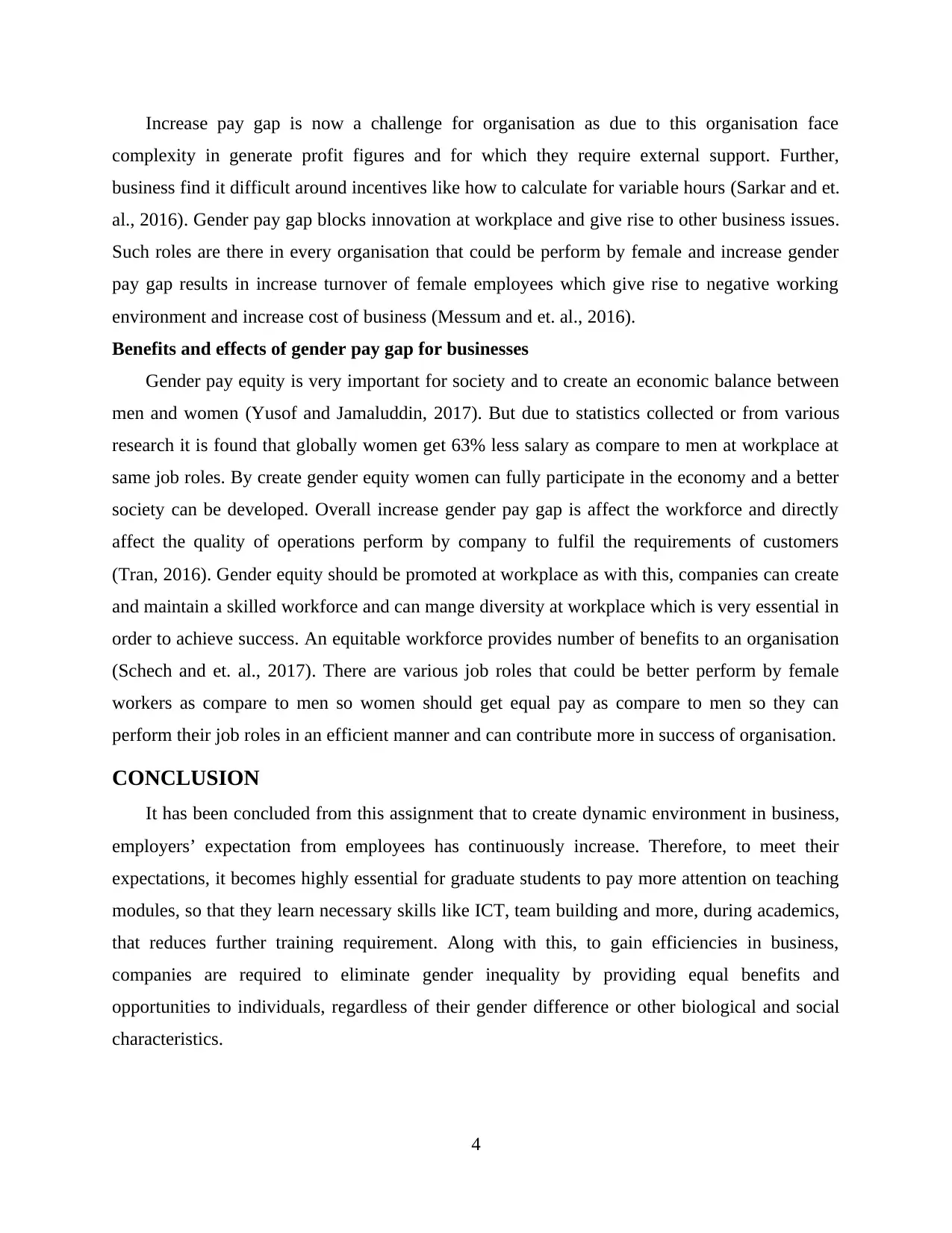
Increase pay gap is now a challenge for organisation as due to this organisation face
complexity in generate profit figures and for which they require external support. Further,
business find it difficult around incentives like how to calculate for variable hours (Sarkar and et.
al., 2016). Gender pay gap blocks innovation at workplace and give rise to other business issues.
Such roles are there in every organisation that could be perform by female and increase gender
pay gap results in increase turnover of female employees which give rise to negative working
environment and increase cost of business (Messum and et. al., 2016).
Benefits and effects of gender pay gap for businesses
Gender pay equity is very important for society and to create an economic balance between
men and women (Yusof and Jamaluddin, 2017). But due to statistics collected or from various
research it is found that globally women get 63% less salary as compare to men at workplace at
same job roles. By create gender equity women can fully participate in the economy and a better
society can be developed. Overall increase gender pay gap is affect the workforce and directly
affect the quality of operations perform by company to fulfil the requirements of customers
(Tran, 2016). Gender equity should be promoted at workplace as with this, companies can create
and maintain a skilled workforce and can mange diversity at workplace which is very essential in
order to achieve success. An equitable workforce provides number of benefits to an organisation
(Schech and et. al., 2017). There are various job roles that could be better perform by female
workers as compare to men so women should get equal pay as compare to men so they can
perform their job roles in an efficient manner and can contribute more in success of organisation.
CONCLUSION
It has been concluded from this assignment that to create dynamic environment in business,
employers’ expectation from employees has continuously increase. Therefore, to meet their
expectations, it becomes highly essential for graduate students to pay more attention on teaching
modules, so that they learn necessary skills like ICT, team building and more, during academics,
that reduces further training requirement. Along with this, to gain efficiencies in business,
companies are required to eliminate gender inequality by providing equal benefits and
opportunities to individuals, regardless of their gender difference or other biological and social
characteristics.
4
complexity in generate profit figures and for which they require external support. Further,
business find it difficult around incentives like how to calculate for variable hours (Sarkar and et.
al., 2016). Gender pay gap blocks innovation at workplace and give rise to other business issues.
Such roles are there in every organisation that could be perform by female and increase gender
pay gap results in increase turnover of female employees which give rise to negative working
environment and increase cost of business (Messum and et. al., 2016).
Benefits and effects of gender pay gap for businesses
Gender pay equity is very important for society and to create an economic balance between
men and women (Yusof and Jamaluddin, 2017). But due to statistics collected or from various
research it is found that globally women get 63% less salary as compare to men at workplace at
same job roles. By create gender equity women can fully participate in the economy and a better
society can be developed. Overall increase gender pay gap is affect the workforce and directly
affect the quality of operations perform by company to fulfil the requirements of customers
(Tran, 2016). Gender equity should be promoted at workplace as with this, companies can create
and maintain a skilled workforce and can mange diversity at workplace which is very essential in
order to achieve success. An equitable workforce provides number of benefits to an organisation
(Schech and et. al., 2017). There are various job roles that could be better perform by female
workers as compare to men so women should get equal pay as compare to men so they can
perform their job roles in an efficient manner and can contribute more in success of organisation.
CONCLUSION
It has been concluded from this assignment that to create dynamic environment in business,
employers’ expectation from employees has continuously increase. Therefore, to meet their
expectations, it becomes highly essential for graduate students to pay more attention on teaching
modules, so that they learn necessary skills like ICT, team building and more, during academics,
that reduces further training requirement. Along with this, to gain efficiencies in business,
companies are required to eliminate gender inequality by providing equal benefits and
opportunities to individuals, regardless of their gender difference or other biological and social
characteristics.
4
Paraphrase This Document
Need a fresh take? Get an instant paraphrase of this document with our AI Paraphraser
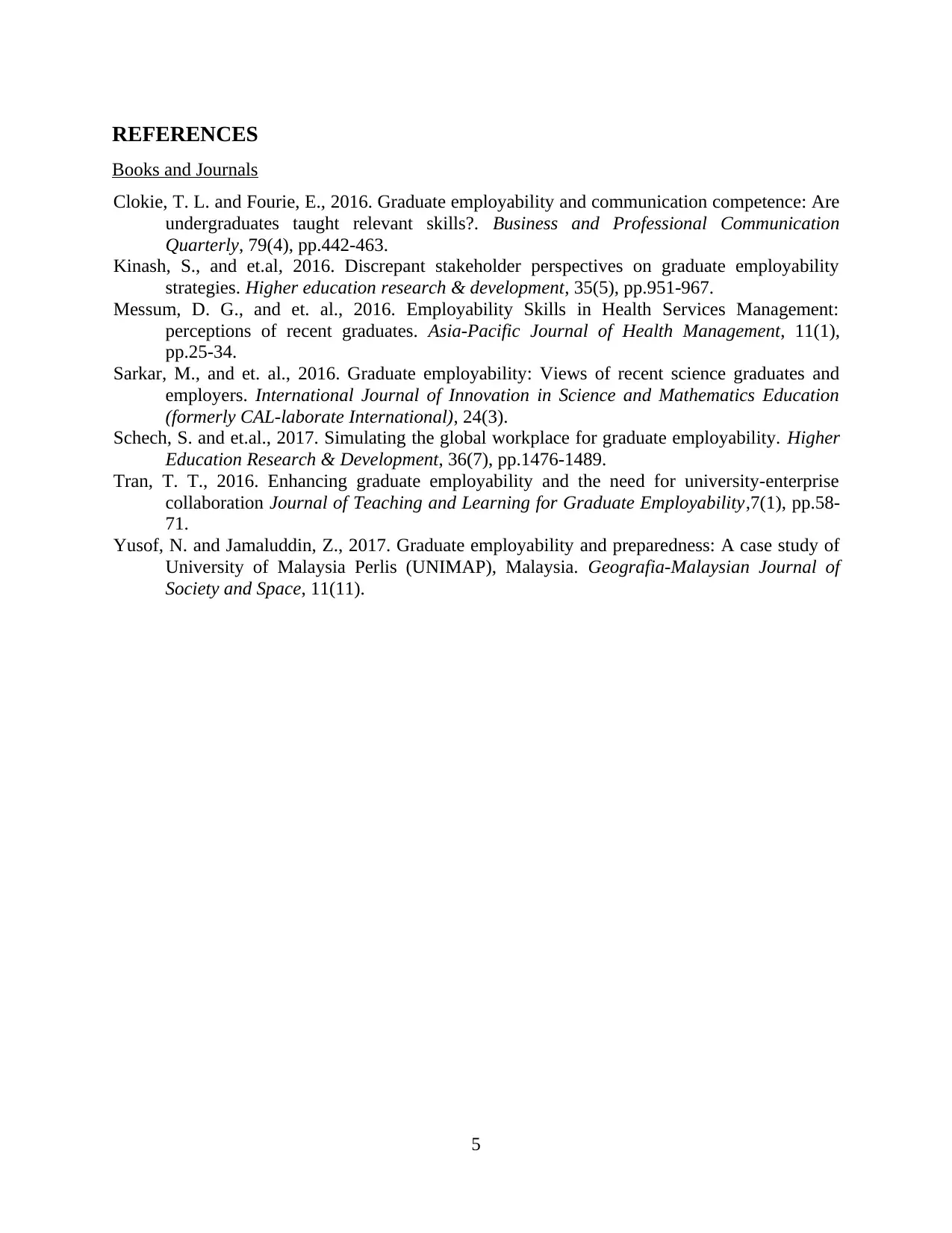
REFERENCES
Books and Journals
Clokie, T. L. and Fourie, E., 2016. Graduate employability and communication competence: Are
undergraduates taught relevant skills?. Business and Professional Communication
Quarterly, 79(4), pp.442-463.
Kinash, S., and et.al, 2016. Discrepant stakeholder perspectives on graduate employability
strategies. Higher education research & development, 35(5), pp.951-967.
Messum, D. G., and et. al., 2016. Employability Skills in Health Services Management:
perceptions of recent graduates. Asia-Pacific Journal of Health Management, 11(1),
pp.25-34.
Sarkar, M., and et. al., 2016. Graduate employability: Views of recent science graduates and
employers. International Journal of Innovation in Science and Mathematics Education
(formerly CAL-laborate International), 24(3).
Schech, S. and et.al., 2017. Simulating the global workplace for graduate employability. Higher
Education Research & Development, 36(7), pp.1476-1489.
Tran, T. T., 2016. Enhancing graduate employability and the need for university-enterprise
collaboration Journal of Teaching and Learning for Graduate Employability,7(1), pp.58-
71.
Yusof, N. and Jamaluddin, Z., 2017. Graduate employability and preparedness: A case study of
University of Malaysia Perlis (UNIMAP), Malaysia. Geografia-Malaysian Journal of
Society and Space, 11(11).
5
Books and Journals
Clokie, T. L. and Fourie, E., 2016. Graduate employability and communication competence: Are
undergraduates taught relevant skills?. Business and Professional Communication
Quarterly, 79(4), pp.442-463.
Kinash, S., and et.al, 2016. Discrepant stakeholder perspectives on graduate employability
strategies. Higher education research & development, 35(5), pp.951-967.
Messum, D. G., and et. al., 2016. Employability Skills in Health Services Management:
perceptions of recent graduates. Asia-Pacific Journal of Health Management, 11(1),
pp.25-34.
Sarkar, M., and et. al., 2016. Graduate employability: Views of recent science graduates and
employers. International Journal of Innovation in Science and Mathematics Education
(formerly CAL-laborate International), 24(3).
Schech, S. and et.al., 2017. Simulating the global workplace for graduate employability. Higher
Education Research & Development, 36(7), pp.1476-1489.
Tran, T. T., 2016. Enhancing graduate employability and the need for university-enterprise
collaboration Journal of Teaching and Learning for Graduate Employability,7(1), pp.58-
71.
Yusof, N. and Jamaluddin, Z., 2017. Graduate employability and preparedness: A case study of
University of Malaysia Perlis (UNIMAP), Malaysia. Geografia-Malaysian Journal of
Society and Space, 11(11).
5
1 out of 8
Related Documents
Your All-in-One AI-Powered Toolkit for Academic Success.
+13062052269
info@desklib.com
Available 24*7 on WhatsApp / Email
![[object Object]](/_next/static/media/star-bottom.7253800d.svg)
Unlock your academic potential
Copyright © 2020–2025 A2Z Services. All Rights Reserved. Developed and managed by ZUCOL.





